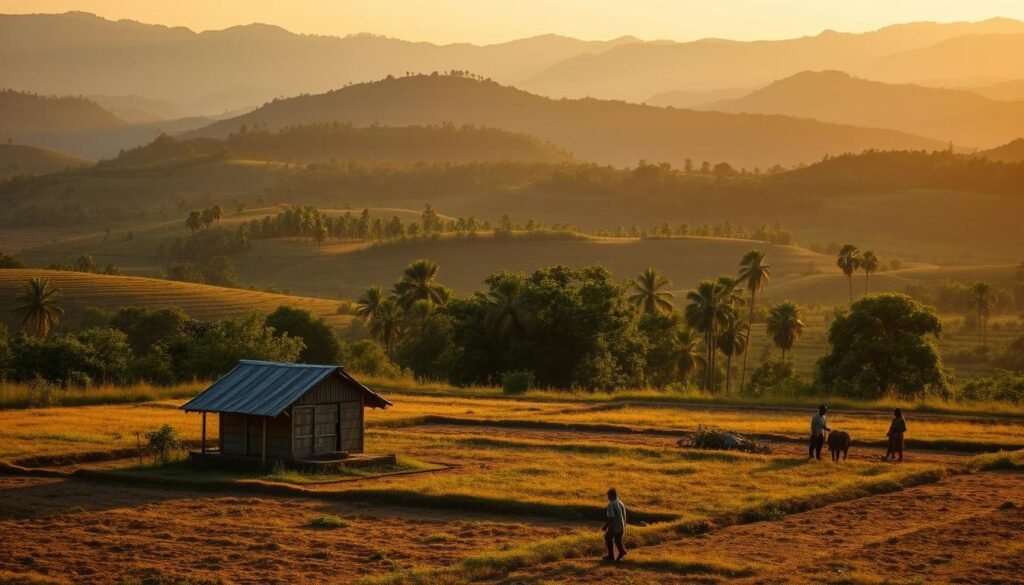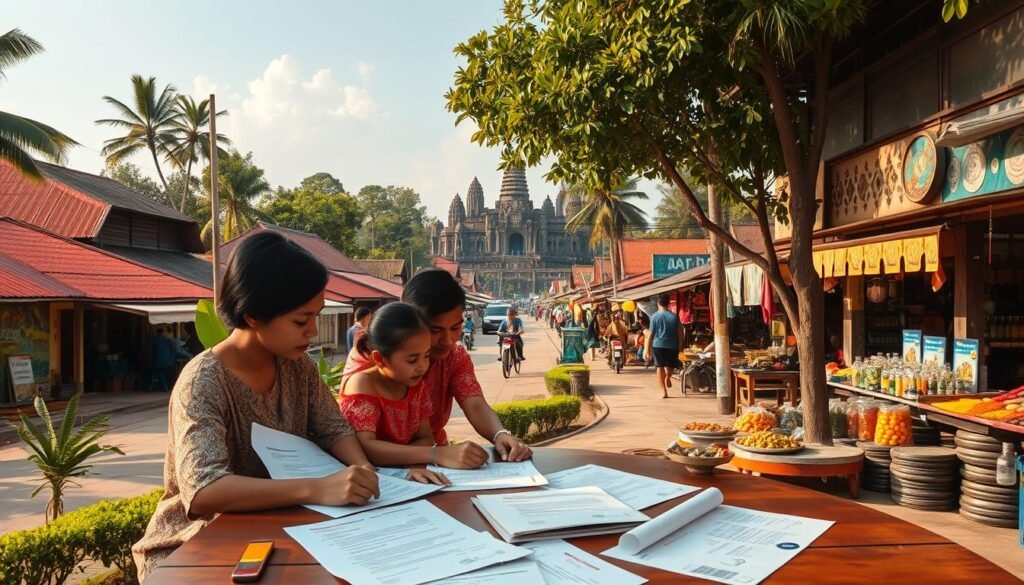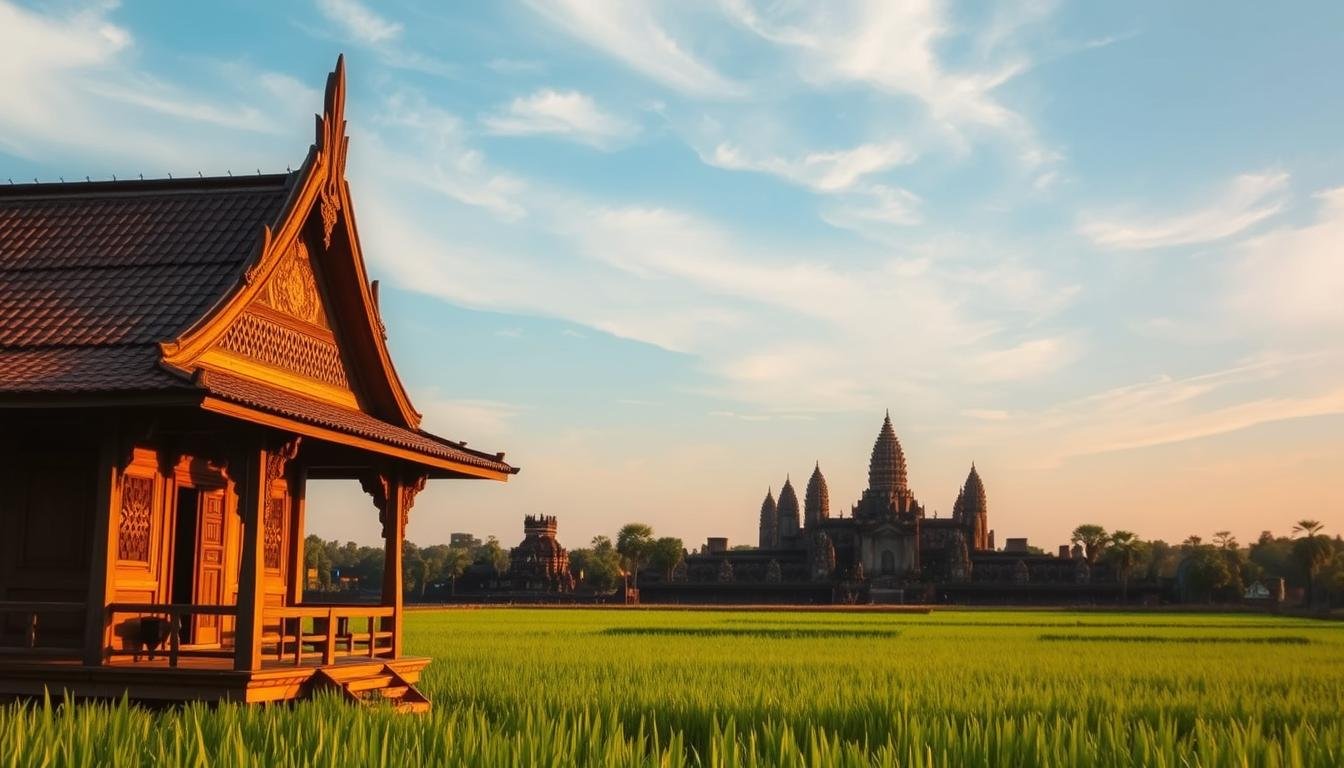Thinking about investing in Cambodian real estate? You might wonder if foreigners can own land here. The answer is no, thanks to Article44 of the Cambodian Constitution. It says only people or companies from Cambodia can own land.
But, there are other ways for foreigners to use land in Cambodia. These options are key for investors wanting to get into the local property market.
Key Takeaways
- You can’t directly own land in Cambodia as a foreigner.
- Article44 of the Cambodian Constitution governs land ownership.
- Alternative methods and legal structures can help foreigners control land.
- Understanding these alternatives is key for foreign investors.
- Foreign investors can navigate Cambodia’s property market well.
The Legal Framework of Land Ownership in Cambodia
Understanding land ownership laws in Cambodia is key for foreign investors. It’s important to know the laws and rules for owning property here.
Overview of Cambodian Property Law
The Land Law, the Law on Investment, and the Law on Condominiums guide property ownership in Cambodia. These laws set rules for foreign ownership. Land titles can be “hard” or “soft,” depending on if it’s registered or not.
Article 44 of the Constitution Explained
Article 44 of the Cambodian Constitution says foreigners can’t own land. This rule helps protect national interests. But, there are ways for foreigners to invest in real estate in Cambodia.
Recent Legal Developments Affecting Foreign Investors
New laws, like the Law on Condominiums and the Trust Law, open up options for foreign investors. For example, foreigners can own condos through strata titles. Long-term leases are also an option. Keeping up with these changes is important for success in the market.
- Key laws governing property ownership in Cambodia include the Land Law and the Law on Condominiums.
- Foreigners are prohibited from owning land under Article 44 of the Constitution.
- Alternative investment options for foreigners include strata titles and long-term leases.
Foreign Ownership Cambodia: Restrictions and Limitations
For expats wanting to invest in Cambodia’s property market, knowing the rules is key. It’s important to grasp the limits set by Article44 of the Cambodian Constitution.

What Article44 Specificall Prohibits
Article44 of the Cambodian Constitution clearly states that foreigners can’t own land. This rule applies to all kinds of property, not just certain types. As an expat, knowing this is important because it limits your options for investing in property in Cambodia.
Types of Property Foreigners Cannot Own
The rules set by Article44 cover many types of properties, including:
- Agricultural land
- Residential property
- Other forms of land ownership
These rules make it hard for foreigners to invest in Cambodia’s property market.
Enforcement and Consequences of Illegal Ownership
The Cambodian government is strict about following Article44. If you break these rules, you could lose your property. It’s important to follow the law to protect your investment.
When thinking about investing in Cambodia, knowing these rules is vital. Understanding the law and getting professional advice can help you make smart choices about your investments.
Legal Alternatives for Foreign Property Investment
Cambodia has rules against foreign land ownership. But, there are legal ways for international investors to own property. It’s important to know these options to succeed in the Cambodian real estate market.
Purchasing Condominiums Through Strata Titles
Foreign investors can buy condominiums with strata titles. This lets them own up to 70% of a building. The other 30% must be owned by Cambodians. The strata title system is clear and recognized by law, making it appealing.
Securing Long-Term Leases (50-99 Years)
Investors can also get long-term leases, from 50 to 99 years. These leases can be renewed. It’s key to make sure lease agreements protect your rights.
Establishing a Cambodian Land Holding Company
Setting up a Cambodian Land Holding Company is another strategy. This involves creating a company with a Cambodian partner. The foreign investor can have control through corporate structures.
Required Cambodian Ownership Percentage
The company must be registered in Cambodia. The Cambodian ownership percentage can change based on the business structure and agreements.
Corporate Structure and Governance
Planning the corporate structure and governance is vital. It’s important to define roles, responsibilities, and profit-sharing. This ensures compliance with Cambodian laws and protects all parties’ interests.
Nominee Structures: Legal Risks and Considerations
Nominee structures are another option. A Cambodian citizen holds the property for the foreign investor. But, this method has big legal risks, like disputes and losing control over the property.
In summary, while there are limits on foreign land ownership in Cambodia, there are legal ways to invest in property. Each option has its own rules, benefits, and risks. It’s important to think carefully and seek professional advice.
Step-by-Step Guide to Acquiring Property Rights
To buy property in Cambodia, you must know the steps to get property rights. This includes doing research, checking the property, and registering it with the government.
Conducting Property Due Diligence
First, do a deep check on the property. This makes sure the property is legal and safe from problems.
Title Verification Process
Make sure the seller can legally sell the property. Also, check if the title is clear of any disputes.
Checking for Encumbrances
Look for any mortgages, liens, or legal issues that could impact your ownership. It’s key to know the property is clear of these.
Negotiating and Documenting Your Agreement
After checking the property, talk about the sale terms and write an agreement. This agreement should cover all the sale details.
It’s smart to have lawyers help make sure the agreement protects you.
Working with Cambodian Attorneys and Notaries
Local lawyers and notaries are very helpful in Cambodia. They know the law well and help make sure everything is done right.
They can review contracts, do the property check, and stand up for your rights in court.
Registering Your Property Interest with Authorities
The last step is to register your property with the government. You’ll need to give them the right papers and pay fees.
Required Documentation
You’ll need the sale agreement, ID, and proof of payment to register.
Fee Structure and Timeline
Know the fees and how long it takes to register. Fees change based on the property and where it is.
| Registration Step | Required Documents | Fees | Timeline |
|---|---|---|---|
| Initial Registration | Sale and Purchase Agreement, ID | $100-$500 | 1-3 months |
| Title Deed Issuance | Proof of Payment, Registration Receipt | $50-$200 | 3-6 months |

By following these steps and getting help from local experts, you can buy property in Cambodia easily and safely.
Protecting Your Investment as an American Investor
Investing in Cambodia needs a deep understanding of the legal and financial scene. As an American investor, knowing the safeguards and strategies is key to protecting your assets.
Legal Safeguards Under Cambodian-American Relations
The ties between Cambodia and the US offer a framework for protecting investments. It’s important to grasp the treaties and agreements that protect your rights as an investor.
Insurance and Risk Management Strategies
Using insurance and risk management is vital to reduce risks in property investment in Cambodia. Look into insurance options for natural disasters, political instability, and other unexpected events.
Regional Variations in Property Regulations
Property laws in Cambodia differ by region. Knowing these variations is essential to follow local laws and regulations.
Repatriation of Funds and Tax Considerations
Understanding repatriation of funds and tax laws is critical for American investors. Familiarize yourself with Cambodia’s tax laws and the process for bringing your money back.
| Key Considerations | Description | Impact on Investment |
|---|---|---|
| Legal Safeguards | Treaties and agreements between Cambodia and the US | Protects investor rights |
| Insurance Strategies | Coverage for natural disasters and political instability | Mitigates possible risks |
| Regional Regulations | Variations in property laws across regions | Affects compliance and investment strategy |
| Repatriation and Tax | Procedures and laws governing fund repatriation and taxation | Influences investment returns and financial planning |
Conclusion
You now know that Article44 of the Cambodian Constitution limits foreign land ownership. But, this doesn’t stop you from investing in Cambodia’s property market.
Legal options like buying condominiums through strata titles or getting long-term leases are available. You can also start a Cambodian land-holding company. These ways let you benefit from Cambodia’s growing real estate.
For a successful investment, do your homework well. Work with trusted lawyers and notaries. Also, make sure to register your property interest with the right authorities.
Understanding the legal rules and risks of foreign ownership in Cambodia is key. This knowledge helps you make smart choices and safeguard your investment.





